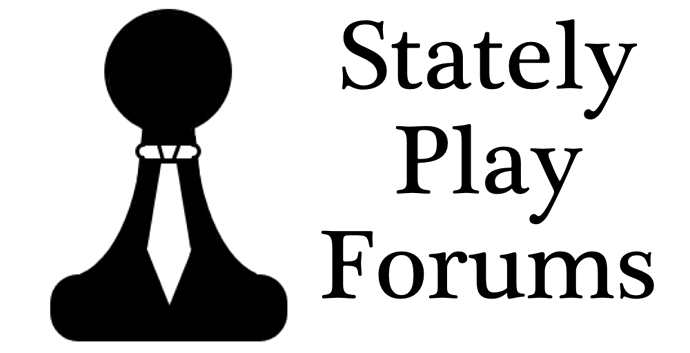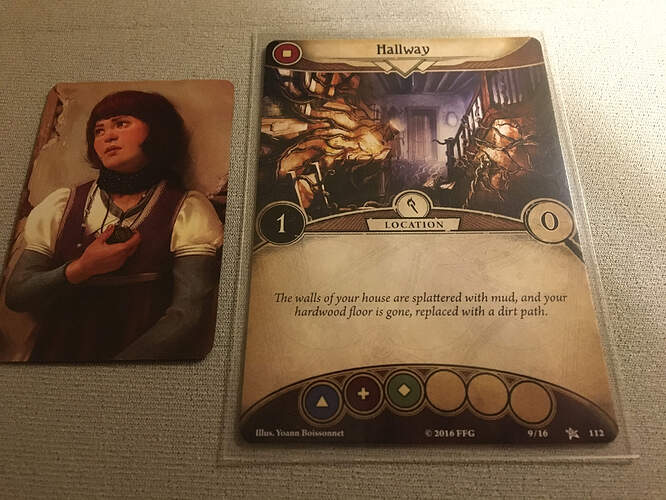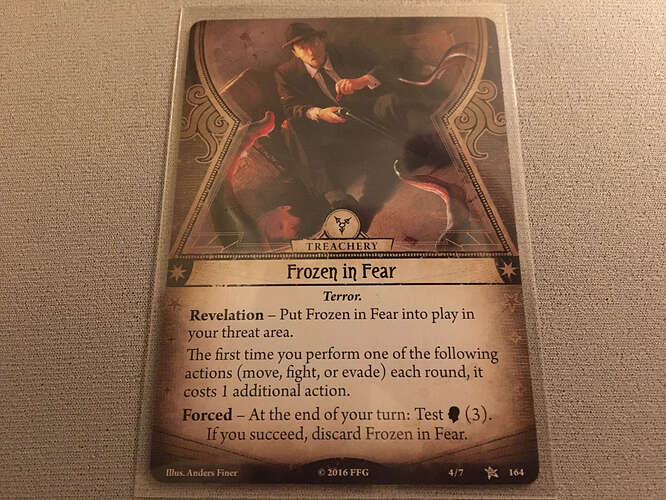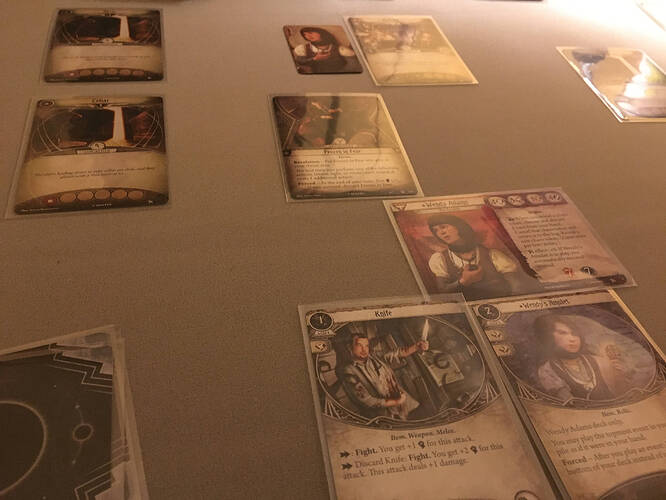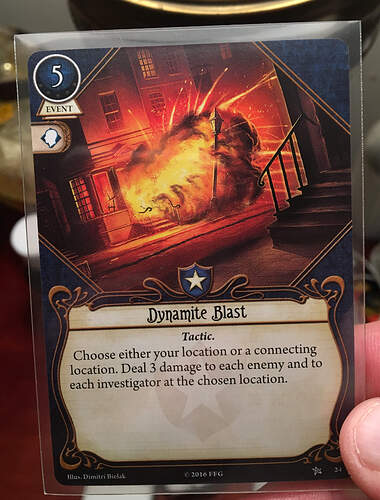Originally published at: http://statelyplay.com/2017/02/07/cardboard-critque-arkham-horror-the-card-game/
Tabletop •
While the Cthulhu Mythos burst like a purulent, racist boil from the twisted mind of H.P. Lovecraft way back in the 1920’s, it’s only been in the last 10 years or so that Fantasy Flight Games has managed to turn it into a means to print money. Fantasy Flight has mastered the genre and has created a handful of tabletop titles rife with existential dread and, of course, tentacles. Their latest recalls their first, and most popular, game to tread these dark paths: Arkham Horror. Only this time, there’s no board, no 8,000 cardboard chits, and no FAQ full of rules exceptions. Just cards. Lots and lots of cards. Arkham Horror: The Card Game is another LCG from Fantasy Flight. If you're not aware, LCG stands for "Look! Cash Gone!" and is FFG's brilliantly legal method of pilfering our wallets. LCGs resemble standard Collectible Card Games in that new cards are always just a drive to the game store away. The difference is that with an LCG there are no random booster packs. Every month or so a new booster is released and, when you buy it--and you will buy it--, you get every card released for that expansion. No searching for rare or legendary cards, you're the proud owner of everything FFG has printed for the game. Now find a box to store it all in.
Arkham Horror: The Card Game begins with what they call the Core Set, which comes with enough cards and chits to play as 2 different characters and play through 3 interlinked scenarios–a campaign, if you will. In true FFG fashion, the game is listed for 1-4 players, but if you want to play with 3 or 4 you’ll need to buy a second copy of the core box, meaning you’ll have useless copies of all the scenario and story cards. Kind of a bummer, but I bought two copies so FFG wins again.
[caption id=“attachment_993” align=“aligncenter” width=“4032”]
For an urchin, Wendy has a really nice house.[/caption]Each player controls a deck which represents their character similar to Sentinels of the Multiverse. Unlike SotM, here you can craft your starting deck to include thirty cards however you wish, with some rules laid down for good measure. These rules are pretty basic such as not allowing more than 2 copies of any one card in your deck and only including level “0” cards at the beginning. You’ll only get access to higher level cards by spending experience points between scenarios. Yes, Arkham Horror: The Card Game plays closer to an RPG than any of its other cardboard cousins.
Apart from the player decks, there is also an Act and Agenda deck in play. The Act deck tells the story of your character(s) as they progress through the story, while the Agenda deck tells the story of what the dark forces of the universe are getting away with. Basically, the Agenda deck is a timer and you’ll want to get through the Act deck before the Agenda deck runs out. The Agenda deck will advance on its own as Doom tokens are added to it, one coming automatically each round but others also adding as Bad Shit starts happening. Probably not a huge spoiler: there’s a lot of Bad Shit happening in Arkham, Massachusetts.
[caption id=“attachment_995” align=“aligncenter” width=“4032”]
My wife’s reaction when I told her I was getting into another LCG.[/caption]The Act deck is advanced by different methods which are defined on the Act cards themselves. Sometimes it will be investigating areas on the map and finding a certain number of Clues, other times it will be destroying a specific hellbeast.
There’s also a Mythos deck which fulfills the role of every Mythos deck in every FFG Lovecraft game: kick you in the ass. Each round, every player will have to draw and deal with whatever nightmare pops up, be it a monster, trap, or creeping insanity. If they aren’t dealt with, they will pile up and you will either die a slow, torturous death or watch helplessly as your character’s mind cracks.
I mentioned a map before. There’s no board, instead locations are printed on cards in a rather brilliant fashion. The backs of each location card are identical except for title and flavor text (more on this in a second), only revealing a room-specific–and possibly spoilerish–image when the room is entered and the card is flipped. Cards are connected via icons, and you can move between cards with similar icons as much as you want, but you won’t know what’s in that unexplored room until you get there.
Each turn you will spend three actions (move, attack, investigate, draw cards, etc.) to try and fulfill the Act card’s requirements while staying sane and alive. Cards are played by spending resources, the game’s very generic currency, and Events fire immediately while assets are played on the table and remain in play. Assets can be weapons, allies, spells, and anything else you can think of that would fit into a 1920’s pulp-horror story. Regardless of whether the characters run out of health or sanity or even if they succeed or fail at getting through the Act deck, each scenario ends by reading a specific ending from the Scenario Guide. It’s a bit like Choose Your Own Adventure, only your adventure has been chosen by playing through the scenario. The Scenario Guide will tell you how the game changes for the next scenario. Did you succeed? Maybe the hostage you found will join you and enter your deck as well as other changes. Did you fail? That ally is gone forever and you also earn weaknesses which clog up your deck.
[caption id=“attachment_996” align=“aligncenter” width=“4032”]
It’s not much, but it’s home.[/caption]There’s more than just mechanical resolutions to each scenario, though. In fact, AH: TCG is a huge success because it’s the first Lovecraft game I’ve played that manages to tell a cohesive, fun story. Every card is loaded with flavor text that you’ll actually find yourself reading instead of skipping over like most FFG titles. The Act and Agenda cards alone spew forth enough italicized text to fill a short novel. Not knowing where the story is going until cards are flipped or locations revealed is brilliant and makes AH: TCG the solo RPG I’ve always wanted. Characters will level up, earning more and more powerful cards. New campaigns will be released every few months with new scenarios filling the gap between the big box releases. As long as you’re willing to shell out the money, AH: TCG is the game that will keep on giving.
The game itself is simple, with little to no need to keep your nose in the rules once you begin and, while it works fine with 2 or 3 (I haven’t played with 4, yet), I really enjoy playing the game solo with a single character. The one downside I’ve had thus far is that some characters are far less combat-ready than others, and the intro campaign is very combat heavy making it hard for those solo characters to make it out alive. Then again, I’ve only used pre-constructed decks and could probably mitigate some of that if I spent the time to build my own decks. Also, skill checks are done without dice but instead use a unique method for randomizing encounters. A handful of predetermined chits are placed in a bag and one is drawn whenever a skill is tested. To make the game easier, simply remove some of the more punitive chits or add more positive ones. The game feels endlessly malleable.
As for replayability, I’ve heard complaints that scenarios are a one-and-done and there is little reason to replay a scenario once you’ve gone through it once. I can see the argument, but I’ve played through the first three scenarios multiple times with different groups and enjoyed it each time. I’ve also played through it solo with different characters with each play having a different feel based on that character’s strengths and weaknesses. True, second and third playthroughs lose the surprise factor, but there’s still a good game driving the story and it works even when the story’s resolution is known.
Arkham Horror: The Card Game isn’t just a brilliant Lovecraft game, it’s a brilliant game that just happens to have a Lovecraftian theme. I’ve already bought the Dunwich Legacy, the next major campaign launching point, and plan on picking up each scenario as they’re released. Yes, my wife is upset, but someone has to save the world. Why not me?
